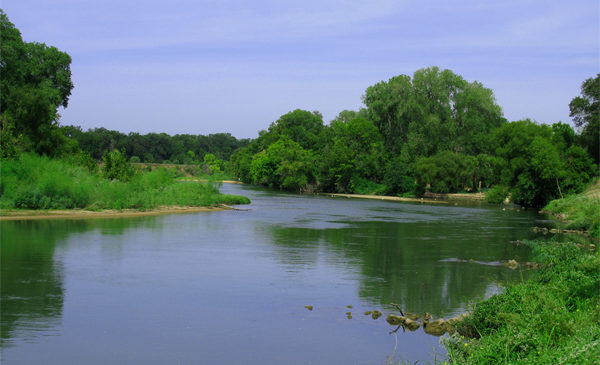LCRA seeks to protect land in river basin from development
Thursday, November 17, 2016 by
Jack Craver The Lower Colorado River Authority is looking for landowners who will agree not to sell their property to developers. In an effort to protect water quality and quantity and to preserve Texas’ cultural heritage, the LCRA has been working with farmers, ranchers and others interested in turning their land into conservation easements that are permanently off-limits to major development.
In a presentation to the LCRA board on Wednesday, Jeff Crosby, executive director of the Colorado River Land Trust, described the initiative’s recent successes in attracting interest from property owners within the Colorado River basin.
The organization had a big year in 2016, working with property owners to put 917 acres in trust.
The most notable acquisition for the trust came earlier this year, when Beverly Blagg opted to put 633 acres of her land in Burnet County in trust. Similarly, the Vacek family put 250 acres of land that it has owned in Fayette County since 1899 in trust.
Property owners have financial incentives to work with the land trust. Not only are there potential tax breaks for which a landowner might qualify, but removing the opportunity for development of the land will often lead to a decline in its assessed value.
“The taxes they end up paying go down, so as a result of them making that (conservation) pledge, they can afford to keep their land,” explained John Miri, LCRA chief administrative officer, in an interview with the Austin Monitor.
Once the property owner agrees to put the land into trust, the agreement is “irrevocable,” he said.
It’s not the first time the agency has sought to protect land from development for the purpose of conservation or water protection. But in the past it has relied exclusively on acquiring land directly, sometimes to convert into parks or simply development-free open space. The CRLT, explained Crosby to the board, “is a third tool” it can use.
“We can only buy so many acres, but we can work with some of these folks who own land but want to preserve it, and we can give them another tool,” said Miri. “It’s kind of a more efficient way.”
The land trust is one example of the agency’s evolving attitude toward the resources over which it does not have direct control.
“Forty years ago, LCRA’s position was sort of, ‘We’re going to take a little piece of the world and just do it right ourselves,’” Miri said. “But we kind of look at it like the universe is too big, so we’re trying to find ways to partner with others and just be a force to help them do it right.”
The CRLT isn’t looking for any property within the river basin but is hoping to identify land based on a variety of criteria. “Lands that have a direct connection” to water quality and quantity, said Crosby, are high on the list. Another priority is to preserve “heritage lands” that have served as family farms or ranches for generations.
Crosby told the board that the four-year-old organization, which currently has only two employees, is applying to win accreditation from the Land Trust Accreditation Commission, an honor that has been bestowed on only 350 of the 1,800 land trusts throughout the country. If the 500-page application that the CRLT is submitting is successful, said Crosby, it might help the group’s efforts to raise funds from private and public sources.
Timothy Timmerman, chair of the LCRA board of directors, applauded the land trust’s recent successes, notably with regard to the Vacek farm. Noting that many property owners are initially hesitant to consider putting their land in trust, Timmerman said that they need not worry because the CRLT is very “landowner-friendly.”
The Austin Monitor’s work is made possible by donations from the community. Though our reporting covers donors from time to time, we are careful to keep business and editorial efforts separate while maintaining transparency. A complete list of donors is available here, and our code of ethics is explained here.
You're a community leader
And we’re honored you look to us for serious, in-depth news. You know a strong community needs local and dedicated watchdog reporting. We’re here for you and that won’t change. Now will you take the powerful next step and support our nonprofit news organization?




